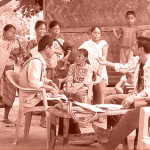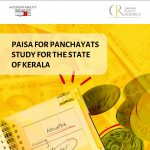
Civil Organisations at the Grassroots Must be Supported on their COVID-19 Efforts
14 July 2020
Since the COVID-19 pandemic began in March and the subsequent lockdowns, millions of lives have been thrown out of gear. At this time, larger civil society organisations (CSOs) have been making valuable contributions, and this has been rightfully recognised and applauded. But the critical role played by community workers at the last mile has often gone unnoticed.
Participatory Research in Asia (PRIA) recently launched a report which highlights the different kinds of support that CSOs are providing to vulnerable communities in this hour of need. Faced with severe physical, monetary and human resource constraints themselves, 89% are carrying out activities such as relief material distribution, 19% are involved with information collection, 47% with awareness and campaigns, and some with generation of livelihood opportunities, and liaising with local administrations. I also realised the extent of involvement when I saw the WhatsApp groups for Hum Aur Humaari Sarkaar (Accountability Initiative’s flagship capacity development programme for grassroots development professionals) course participants, and the messages being shared on the different kinds of activities being carried out by them.
Conversations with Hum Aur Humaari Sarkaar alumni revealed exactly how grassroots-based organisations are adapting to an unprecedented situation caused by the pandemic.
CSOs are not only faced with the new challenge of working in the midst of contagion, which hampers their visits to villages, but can also face roadblocks when it comes to getting support from the local administration. In fact, this has emerged to be an overarching theme in not only our conversation with CSO workers but has been mentioned as a challenge by 93% of respondents in the PRIA report.
Also, most of the relief and awareness activities carried out by organisations require government support or backing in some way or the other, be it in the form of access or information. Even problems with seemingly simple solutions (such as issuing of passes) have tended to go unanswered. While this can be because the administration is already stretched beyond capacity and is working overtime, this does hamper the much-needed relief efforts of CSOs on the ground.
For example, the problem of mobility and lack of passes needed to travel during the lockdown emerged as a serious complication, affecting both material distribution and awareness creation work. Our alumni working with CSOs told us that this was a persistent problem during the earlier phases of the lockdown. In one instance, the team at a Rajasthan-based CSO shared how the mobility of their staff and volunteers was restricted because government functionaries feared that their movement would lead to the spread of the virus. As a result, they were forced to limit activities during the time. Teething problems such as this were ironed out after the initial phases, and towards the later stages of the lockdown, CSO workers did not report this problem.
As more and more people are displaced, and out of work, the need for material distribution such as ration remains crucial. However, CSOs are grappling with financial constraints themselves and struggling to meet the needs of all those who are vulnerable. Facilitating linkages between families that are in dire need of basic supplies with government assistance is also far from seamless. Even after providing the government with a list of people who require it, in some cases, ration hasn’t been able to reach some of the intended recipients. While some got only wheat, others got rice, dal and oil, our alumni said.
Another challenge that CSO workers have faced is the gap between grassroots reality and union and state government directives. Even though work under MGNREGA was allowed to start in the later phases of the lockdown so that employment could be provided to returning migrants, CSO workers tell us that they were quite unsuccessful in securing entitlements. When they went to the panchayats to facilitate this process for community members, they were told that the panchayats would be unable to sanction any work due to lack of funds.
Local NGO workers are often deeply embedded in the communities they work with. In such a situation, when these communities are under duress, inadequate or lack of support from the administration can leave workers helpless and frustrated. For example, a staffer in an organisation for migrant workers tells us that she was in touch with 50 migrant workers including 3 pregnant women who had set off from Ahmedabad on foot towards their home states. Her lament was that no one from the administration she approached, including the Sarpanch, could find a way to help.
As the threat of the pandemic spreading even further looms large, it is imperative that CSOs and grassroots groups on the ground are given as much support as possible, making sure all safety norms are followed. The NITI Aayog’s Empowered Group 6 recently called upon the large network of NGOs and CSOs in India to contribute to relief efforts, and it is now important that an enabling environment is created at the grassroots level. Mutual trust and strategic cooperation must be the way forward.
The Accountability Initiative at the Centre for Policy Research will be hosting a webinar for managers at CSOs and staff on 31 July 2020. The event will explore the contribution of CSOs during the COVID-19 pandemic, and will discuss their solutions.
To participate, kindly send a mail to [email protected].
Also Read: Emerging Trends and Challenges in Social Protection in Bihar and Uttar Pradesh
Aamna is a Learning and Development Associate at Accountability Initiative.





